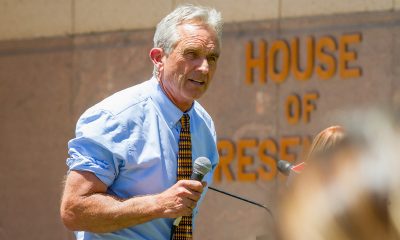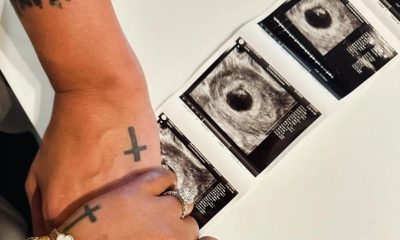Eastern Europe
Gay Lithuania MP sharply criticizes Russia
Tomas Vytautas Raskevičius elected to Seimas in 2020
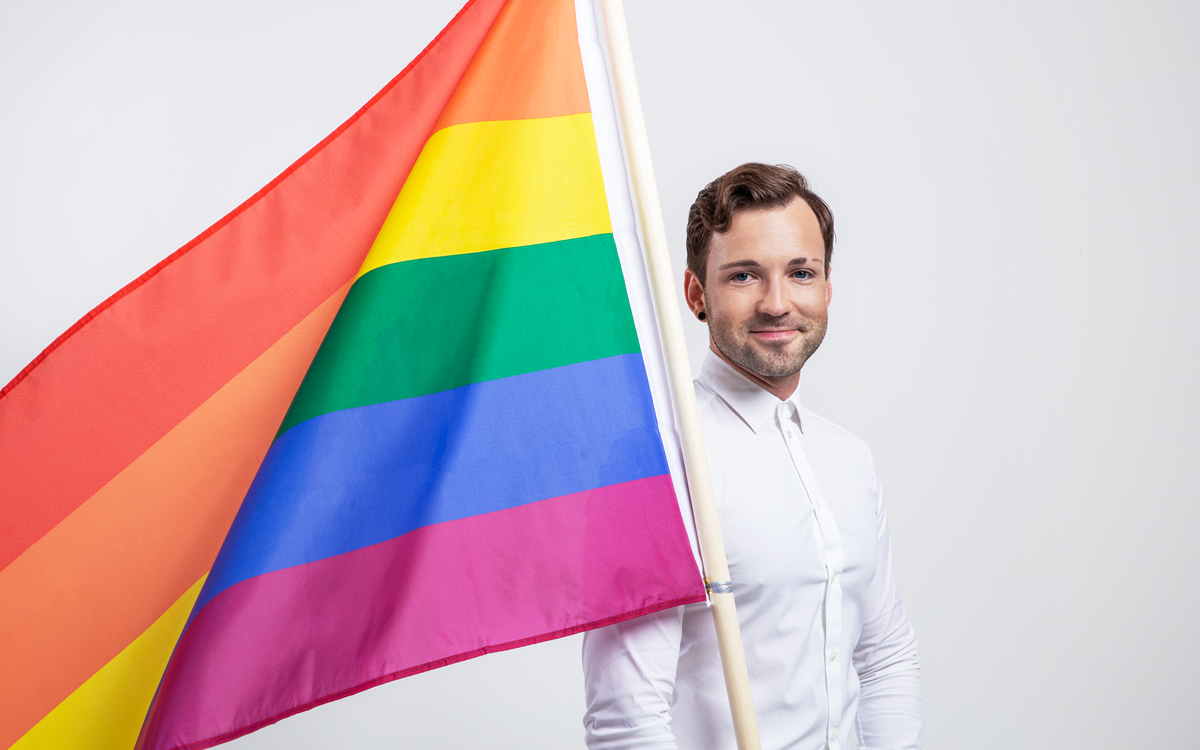
A gay man who is a member of Lithuania’s Parliament last week said his country could be Russia’s next target.
“Historically after independence in the early 90s, Lithuania was very critical and fearful of its attitudes towards its neighbors,” MP Tomas Vytautas Raskevičius told the Washington Blade on April 28 during a telephone interview from Vilnius, the country’s capital, in reference to Russia. “The current events in Ukraine simply prove that we were right.”
“We have to understand very clearly that Russia is using not only military force, not only its gas and oil, but it is also using its soft powers,” added Raskevičius. “These soft powers are certain, specific world views which Russia tries to impose to its neighboring countries and those ideas are usually anti-human rights and anti-liberal democracy, so they are portraying human rights and liberal democracy as a threat, rather as a benefit to the society.”
Raskevičius further stressed that LGBTQ rights are “part of this Russia propaganda campaign.”
“They’re portraying the West as being rotten, plagued with abominations,” he said.
Lithuania borders the Russian enclave of Kaliningrad, Latvia, Belarus, Poland and the Baltic Sea. The country declared its independence from the Soviet Union in 1990, a year before it dissolved.
Raskevičius, 33, is a member of the liberal Freedom Party.
He worked for what is now called the Brooklyn Community Pride Center in New York and the Lithuanian Gay League, among other NGOs, before his election to the Vilnius City Council in 2019. Raskevičius in 2020 won a seat in the Lithuanian Parliament, which is known as the Seimas.
Raskevičius noted he is the second openly gay person elected to the Seimas, but the “first one” with a “pro-LGBT human rights agenda.” Raskevičius currently chairs the Seimas’ Human Rights Committee.
Russian, Belarusian LGBTQ groups relocate to Lithuania
Raskevičius said more than 50,000 Ukrainians have sought refuge in Lithuania since Russia invaded their country in February.
He told the Blade he knows of “isolated incidents” of LGBTQ Ukrainians in the country, noting that “LGBT people went to more open or progressive places than Lithuania.” Raskevičius said LGBTQ organizations are among the NGOs from Russia and Belarus that have relocated to Lithuania after their governments cracked down on them.
“Our local community demonstrates quite a high level of solidarity,” he said. “This is what the struggle for freedom is all about. It’s not only about physical security, but also security from Russian propaganda or soft power.”
Raskevičius also called for continued military cooperation and more economic sanctions against Russia.
“What is really important is not to get used to the war,” he said. “It has already been more than 60 days and you know people are getting used to seeing the terrible things on their TV and it becomes routine … we should be very mindful that we push harder because if Ukraine doesn’t win, we become the next one in the line.”
Raskevičius added Lithuania places “a lot of trust in our security partners, including the United States and NATO.”
“I wouldn’t say there is panic or any kind of that stuff, but it’s very close,” he said. “(Ukraine is) less than 1,000 km (621 miles) away and we have quite a nasty history with the Soviet Union and Russia, so we know what it’s all about it.”
Raskevičius sponsor of civil partnerships bill
Lithuania bans discrimination based on sexual orientation
The country on Sunday officially lifted restrictions for male blood donors who have sex with men, but opposition to LGBTQ rights remains strong. Raskevičius noted Lithuania is one of only six European Union member states that do not legally recognize same-sex couples.
He has introduced a bill that would allow same-sex couples to enter into civil partnerships.
LGBTQ rights opponents who Raskevičius said have “documented ties” to Russia in 2021 launched a petition to remove him as chair of the Seimas’ Human Rights Committee “because apparently a person who is gay cannot chair the committee who is in charge of all human rights.” Recall supporters claimed more than 300,000 people signed the petition, but Raskevičius noted journalists discovered the vast majority of them were fake.
Raskevičius told the Blade that opposition to the civil partnership bill was the “pretext” behind the petition. He acknowledged the ongoing debate over whether lawmakers should consider the measure “with war in our neighborhood,” but he stressed “it’s the best time to do so.”
“We have to choose whether we want to belong to the sphere of influence coming from the East, or we want to move into the West,” said Raskevičius.
Raskevičius’ son is 2 1/2. He told the Blade that fatherhood has shaped his work in support of LGBTQ rights and human rights.
“For a very long time LGBT people were not visible in Lithuania,” said Raskevičius. “LGBT parents was another level of invisibility. These people exist, but they don’t publicly share their experiences because they are concerned about the well-being of their kids.”
“Me and other parents involved in my child’s upbringing made the conscious decision to talk about our experiences publicly,” he added. “We want to encourage people they are not alone.”
The European Court of Human Rights last month heard a challenge to Lithuania’s so-called “gay propaganda law” that specifically bans the distribution of information to minors that “expresses contempt for family values, encourages the concept of entry into a marriage and creation of a family other than stipulated in the Constitution of the republic of Lithuania and the Civil Code of the republic of Lithuania.”
Author Neringa Dangvydė Macatė in 2019 filed a lawsuit against the law after Lithuanian authorities censured her children’s book that featured two same-sex couples. Bob Gilchrist, the openly gay U.S. ambassador to Lithuania, is among those who have publicly criticized the statute.
“Our law is also framed in terms of protecting minors from the detrimental kinds of public information and defines information about LGBT relationships as potentially detrimental,” noted Raskevičius. “Based on that legislation, public authorities could censor public information.”
Raskevičius during the interview also praised the U.S. Embassy and Gilchrist himself for their support of LGBTQ rights in Lithuania.
“The current ambassador demonstrates not only the embassy’s leadership, but he’s demonstrating personal leadership,” said Raskevičius. “He’s very open about who he is and he’s not afraid to speak his mind.”
Raskevičius noted Gilchrist attends public events and speaks about LGBTQ rights on Lithuanian television.
“It’s a very powerful message because we see the United States as a strategic ally,” said Raskevičius. “They would not only defend our territory, but also defend the same values and regarding that, anti homophobic sentiments should have no place.”
Amb. Gilchrist: Proud to speak at today’s conference at Lithuania’s Ministry of Justice with @LGLLithuania and stand up for LGBTQI+ rights. Equal treatment and dignity are American values. pic.twitter.com/SggA2leSOb
— U.S. Embassy Vilnius (@USEmbVilnius) September 29, 2021
🏳️🌈Happy Kaunas Pride!🏳️🌈 We stand w/ 🇱🇹 LGBTQI+ community. All people, no matter who they are/whom they love, deserve = treatment, a life free of fear + recognition of their inherent dignity. Thx to organizers + police for today!#KaunasPride #KaunasPride2021 #USinLT #LoveIsLove pic.twitter.com/RI0uhfg1Ls
— U.S. Embassy Vilnius (@USEmbVilnius) September 4, 2021
Amb. Gilchrist was happy to meet the representatives of Lithuania’s Diversity Charter for a lunch discussion on how to promote diversity, equity, and inclusion in the public and private sector in Lithuania and how the Embassy could help support such initiatives. pic.twitter.com/4RxpkoeDIG
— U.S. Embassy Vilnius (@USEmbVilnius) June 23, 2021
Eastern Europe
LGBTQ Ukrainians bear brunt of psychological toll amid ongoing war
Saturday marks two years since Russia invaded country
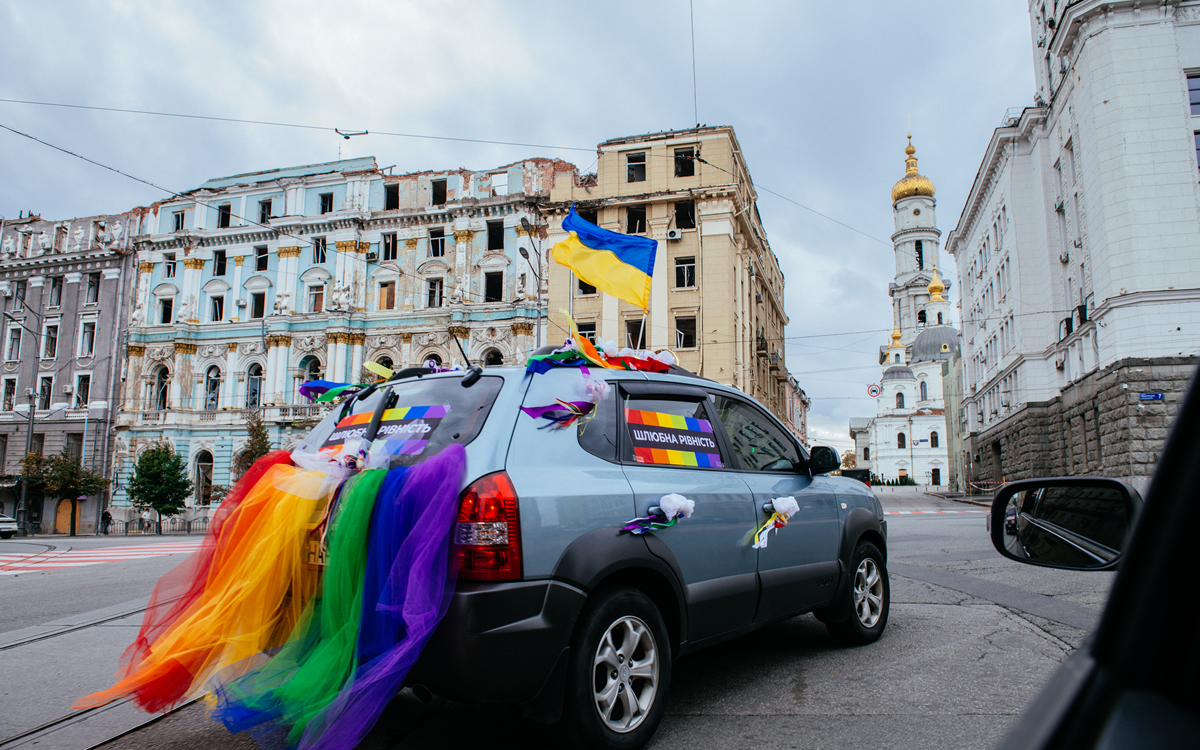
As Ukraine weathers Russian missile attacks and endures a harsh winter, the psychological consequences on its LGBTQ community are emerging as a distressing and often overlooked aspect of the conflict.
Recent reports from Human Rights First, based on their visits to the northeastern Ukrainian region of Kharkiv, shed light on the profound emotional impact experienced by LGBTQ individuals amid the sustained Russian aggression.
Saturday marks two years since Russia’s full-scale invasion of Ukraine began. Throughout this time, Human Rights First has sought to bring human rights into the heart of the discussion surrounding the conflict, offering support to human rights defenders, activist organizations, and individuals profoundly affected by the war.
Human Rights First last November initially surveyed Kharkiv to understand how communities were preparing for the harsh winter. Returning last month they found the LGBTQ community faced not only the physical challenges of extreme temperatures but also the hidden harm of severe psychological distress.
Human rights defenders on the forefront were documenting war crimes and supporting marginalized communities, including LGBTQ individuals. They emphasized the critical need for specialized psychological support within this community.
Vasyl Malikov, a key figure in Kharkiv-based LGBTQ NGOs Alliance.Global and Spectrum Women’s Association in Kharkiv, spoke about the increasing requests for psychological assistance and counseling.
Malikov highlighted the urgent need for both psychologists and a more comprehensive education about mental health and trauma issues.
“Some counseling can be done online, and it’s better than nothing, but what’s really needed is face-to-face time with a psychologist. Of course, that’s resource-intensive,” Malikov said, underscoring the unique challenges faced by the LGBTQ community.
Associate Professor Taras Zhvaniia, collaborating with Alliance.Global, shared insights into the growing demand for psychological support within the LGBTQ community. Initially addressing trauma in children, the scope expanded to include adults grappling with anxiety, depression and other emotional challenges related to the ongoing conflict.
Zhvaniia detailed the psychological struggles unique to the LGBTQ community, ranging from anxiety and panic attacks to specific fears such as reluctance to sleep in beds at home, avoiding bomb shelters and apprehension about routine activities during shelling.
Efforts to increase psychological knowledge for the general population are underway, yet the escalating demand for LGBTQ-focused support outpaces available resources. Human rights defenders have proposed measures, including funding for online counseling and visits by foreign psychologists, specifically tailored to address the psychological impact on the LGBTQ community.
The silent struggle faced by the LGBTQ community in Kharkiv and beyond necessitates international attention, according to Human Rights First. The organization added the lack of adequately trained psychologists raises concerns about the unaddressed psychological impact, underscoring the urgency for U.S. officials and the international community to comprehend and respond to the unique challenges faced by LGBTQ individuals in the midst of the ongoing conflict.
Eastern Europe
LGBTQ community in Kharkiv braces for another winter at war
Ukrainian city is 30 miles from Russian border
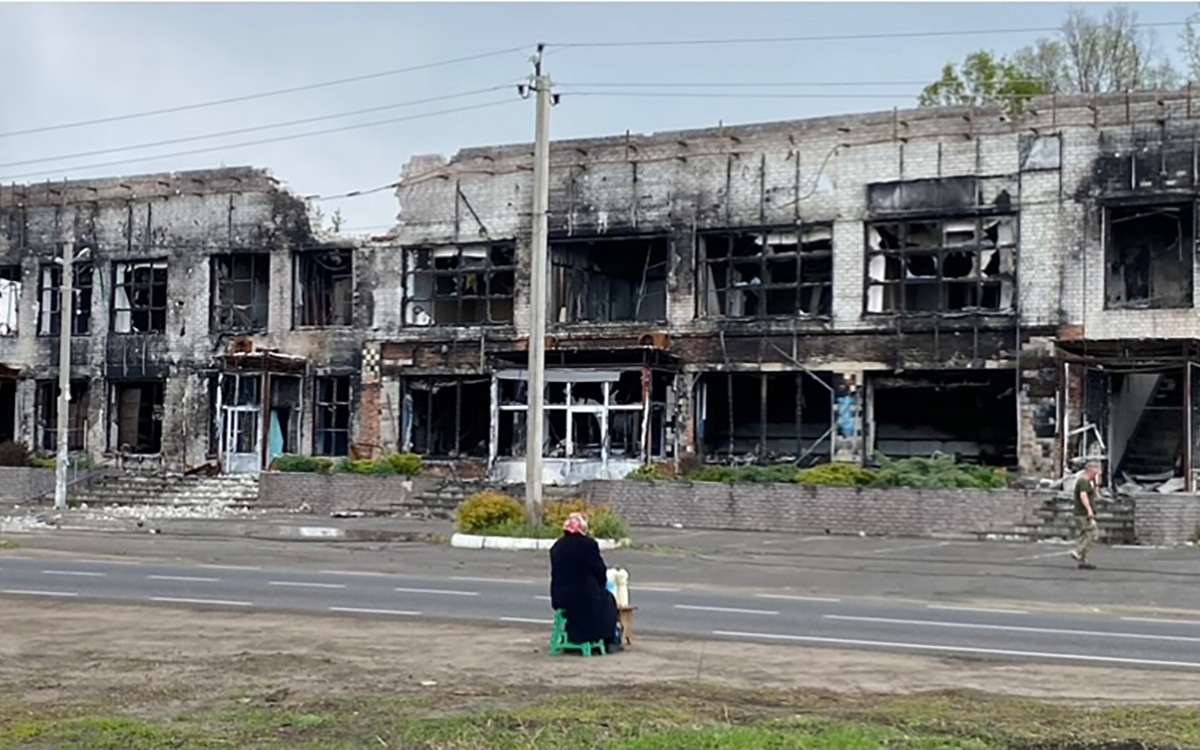
KHARKIV, Ukraine — Only 30 miles from the Russian border, Kharkiv is Ukraine’s second biggest city and was a key target of Russia’s invasion in February last year, when it was almost encircled.
I have been reporting regularly from Kharkiv since last year’s full-scale invasion, and the city is still often bombed by Russian missiles. United States government officials rarely come here because of the security situation. As temperatures plummet, Russia is targeting Ukraine’s heating infrastructure.
It hopes to make life unbearable for people in Ukraine’s cities and force another wave of mass movement out of Ukraine and into Poland and other European countries.
Attacks on Ukraine’s energy grid have begun, and some communities in the city have been particularly vulnerable since Russia’s invasion last year, and are facing a difficult winter.
Vasyl Malikov of the Kharkiv-based LGBTQI NGOs Alliance.Global and Spectrum Kharkiv has been distributing packages of hygiene goods, food and vouchers for humanitarian aid since last year. He helped to set up a new shelter for LGBTQI people and their relatives in the city.
“There are government shelters, and the authorities say they don’t discriminate against who uses them, but we know from lived experience that these official shelters aren’t always welcoming places for LGBTQI people. They feel vulnerable and are harassed there,” Malikov said. “We thought about setting up a shelter last year, but the situation seemed too uncertain and it wasn’t that easy to find premises, but we have gone ahead now and we can offer accommodation for up to 16 people to stay for up to three months.”
Some of those in the shelter are fleeing areas of conflict on the front lines, others have fled domestic violence, and others have been driven away by families who refuse to accept them. Some people, in Kharkiv for medical appointments, stay for days, others stay for weeks or months.
The shelter is a large apartment that has a kitchen and a large room where workshops and social events are held. It is on a block near a metro station which, Malikov says, is a useful place to run to in case of heavy bombardments.
Crucially, a new generator has arrived, which should heat the shelter during power outages. It’s a dual fuel model that can run on diesel or gas and costs around $2,000.
“This is a safe place for LGBTQI people and their families,” explains Malikov. “We shouldn’t have to set up our own facilities, the authorities should be doing this work, but we have to because they don’t.”
Other NGOs are also filling gaps that local authorities are failing to provide. The NGO Sphere has, since 2006 “been uniting women of Kharkiv, including lesbian and bisexual women.”
Tucked in a small office near the city center, some of Sphere’s activists described how their work has adapted to meet the challenges of the war.
“We’ve been providing aid for those forced to flee their homes because of the war,” says Yevheniia Ilinska, a long-standing member of the organization. “We’ve raised money from abroad — including from LGBTQ+ groups — to distribute basic supplies. We’ve been handing out clothes, including socks, and have provided some to our military.”
Sphere’s activists say that beyond its obvious damage and destruction to the city, the war is causing “a social revolution:” many men are away from their homes fighting in the military, and many family dynamics are changing dramatically.
The activists fear a spike in domestic violence when soldiers return home, a phenomenon witnessed in other countries.
“The full-scale war significantly aggravates some of the problems that existed before, including gender-based domestic and sexual violence, and discrimination at work,” Sphere notes on its website.
The war has also helped change some attitudes towards LGBTQ+ people in Ukraine. Last September, when the dangers from rocket attacks made an open-air parade impossible, Sphere helped organize a successful Pride event in the city’s metro system.
“We dressed wearing national symbols and LGBT flags,” says Ilinska. “And the public reception was very positive.”
The reaction is more evidence of a positive shift since last year’s invasion in public attitudes towards LGBTQ+ people, in part because the community’s contribution to the war effort is increasingly seen and valued. Hopes are high that Ukraine will soon legalize same-sex civic partnerships, and eventually same-sex marriages.
But for now, the cold is an immediate challenge. Sphere is raising funds to offer locals a safe place so that “in the event of rocket attacks and power outages, LGBTQ+ people will be able to stay warm indoors, have a hot drink, take a shower, and do laundry,” says Ilinska.
“We’re constantly adapting our work,” says Ilinska. “Adapting our advocacy and our public events, and our projects on targeting humanitarian aid. Kharkiv is changing and so are we, we have to react to this dramatic crisis, to the invasion, and we’re proving that we and our community can resist,” she said.
For more, see Human Rights First’s new report, Ukraine’s Winter War, written by Maya Fernandez-Powell and myself.
Eastern Europe
Transgender soldier from US named Ukrainian military spokesperson
Sarah Ashton-Cirillo was journalist before she enlisted
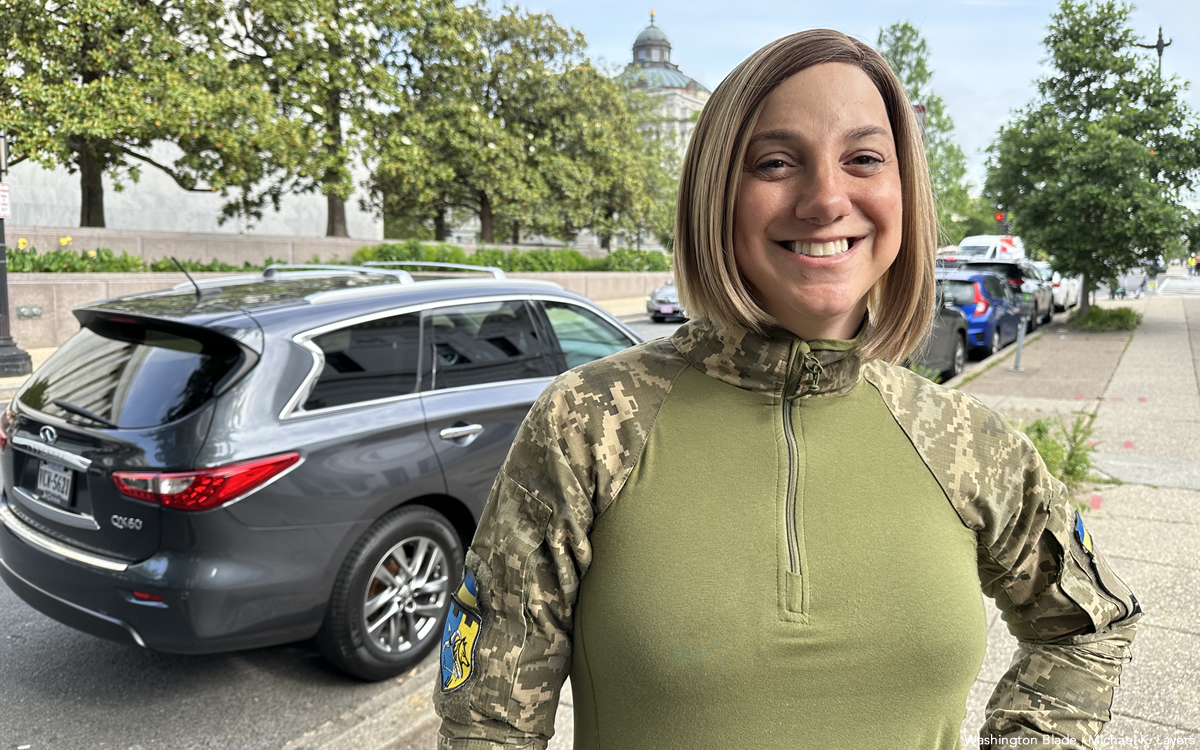
The Armed Forces of Ukraine have named a transgender soldier from the U.S. as one of its English-speaking spokespeople.
The Kyiv Post, an English-language newspaper, last week in a tweet noted Sarah Ashton-Cirillo “has become one of the speakers for the Defense Forces.” Deputy Defense Minister Hanna Malyar is among those who praised Ashton-Cirillo.
“Sara informs the English-speaking audience — she objectively covers the events of the Russian-Ukrainian war, debunks Russian fakes and propaganda,” said Malyar, according to the Kyiv Post. “Sarah’s audience reach on Twitter alone was 28.3 million users. So, the enemies get excited on hateful social networks, of course. However, this has only increased Sarah’s audience.”
Ashton-Cirillo was a journalist when she began to cover the Armed Forces of Ukraine’s Kharkiv Defense Forces at the beginning of Russia’s war against the country in 2022. She eventually enlisted, and a commander from the Defense Ministry on Jan. 31, 2023, facilitated her transfer to the unit’s 209th Batallion of the 113th Brigade.
Ashton-Cirillo, who was born in New York, was working as a senior combat medic in a trench near Kreminna in eastern Ukraine on Feb. 23, 2023, when shrapnel from an enemy artillery shell wounded her. Ashton-Cirillo suffered injuries to her right hand and to her face, and her fellow soldiers had to wait seven hours to evacuate her. Ashton-Cirillo eventually received treatment for her injuries in Kharkiv, Ukraine’s second-largest city that is roughly 130 miles northwest of Kreminna.
The Washington Blade spoke with Ashton-Cirillo in May while she was in D.C.
“The big key there was I wasn’t able to take any painkiller by staying in the trench because I was still technically in battle,” she recalled. “Seven hours after my injury, I finally got to a hospital.”
Ashton-Cirillo on Tuesday told the Blade her “new role within the Armed Forces of Ukraine is a position that has been earned due to my performance on the physical and informational battlefields.”
“What this means is that in today’s Ukraine being a part of the LGBTQ community is neither a benefit nor hindrance, but simply an accepted part of whom a person is,” she said. “The vocal support shown by LGBTQ groups in Ukraine, such as Gender Stream, Kyiv Pride and Ukraine Pride, upon news of this taking place, along with the statement of confidence in me issued by the Ukrainian Ministry of Defense and Deputy Defense Minister Hanna Maliar, made me understand that this battle for the country’s liberation is not about tolerance or acceptance for any one group but freedom and liberty for all Ukrainians.”



